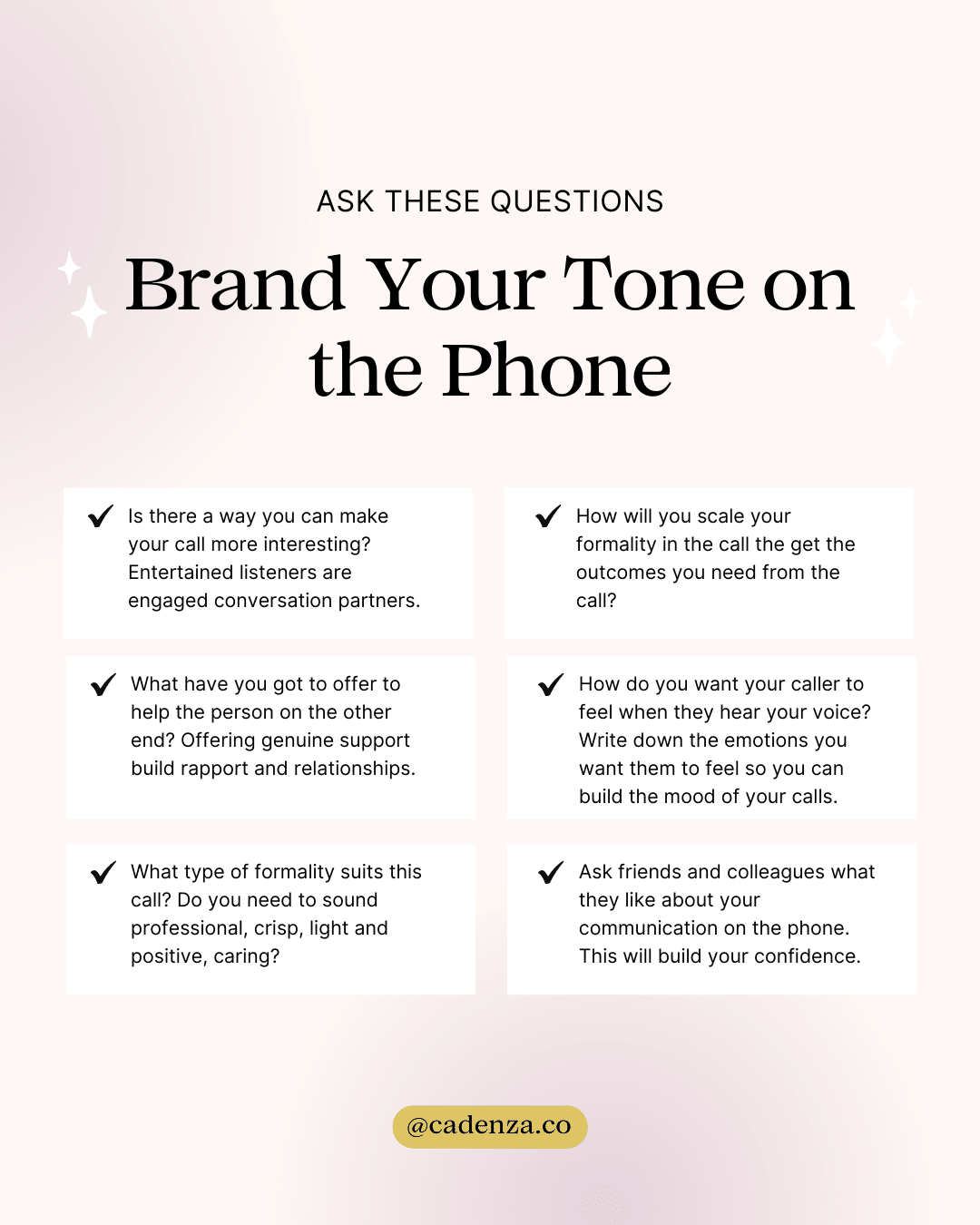Social Intelligence
The Ultimate Guide to Telephone Skills

Are you looking for more ways to build rapport over the phone?
We’ve seen the rise in the need for telephone and webcall skills during the current hybrid work trend.
At one point in our lives, we’ve all been the person who dreaded picking up the phone and experienced jitters. In some cases, your skills on the phone will determine your career destiny. Telephone interviews can often be the first hurdle to clear to score your dream role.
Evaluating your telephone skills could be the thing that sets you apart and propels your career growth.
Have you ever sat down, I mean really sat down and evaluated your telephone skills at work and thought about what you can improve?
If you’re avoiding the phone, worrying about difficult conversation partners on the receiving end or simply wanting to add more professional polish to your communication, this article will get you started on the key principles you need to brand your tone, on the phone.
can shape your career success
It’s time to take a proactive approach to telephone skills.
The dreaded phone call doesn’t need to be dreaded anymore.
Whether you are cold calling, networking, liaising with a colleague or speaking with managers, you can build your telephone skills with these tips.
And if you consider yourself well-versed in telephone skills, I’m pretty sure you can still pick up some increased polish.
Finding your groove consistently on the phone and speaking with total ease and style is a great goal to have because it will equip you with a well-thought-out speaking style that enhances your impression management.
Chances are you can definitely expand on your already solid telephone skills so keep reading!

Solid telephone skills build rapport faster.
This blog is best digested in 3 steps. First, we need to clarify assertive behaviour. Then, we’ll cover 5 assertive behaviours you need to integrate to master the skill and finally we’ll wrap it up with a quick video tutorial, so stay tuned.
You might want to bookmark this page to refer back to later – because it could take more than one sitting!
Here are the steps for you to get a stronger grasp on ingredients your communication needs so that you can showcase your Telephone Skills.
- Read the 7 pointers below
- Pick up a copy of the Communication Growth Plan for Work and review areas that you can expand to extend your professional speaking skills.
- If you like what you’ve learned, join the C-Suite Waitlist or reach out to me directly for executive coaching sessions or book me as a Speaker for your next event or team training.
7 POINTERS TO BUILD YOUR TELEPHONE SKILLS
These tips are perfect to improve your telephone skills for your work and social life:
1. Know Your Target + Audience
If you want to build your telephone skills we recommend you manage your professional calls like you’re branding your personal call centre.
Calls centres all over the world all use a similar “call centre style”, but multi-national organisations with different offices will add subtle style modifications to give their front desks a local feel.
It helps to take the same approach.
Think about how you manage your calls with different stakeholders. Add little details and nuances to engage your client and treat this as an essential personal branding project.
This is a worthwhile activity when you consider that every call you make or take has the opportunity to open huge doors for you professionally. A bit of forethought can help you to create a specific personality and style in your telephone communication that sincerely reflects you and your strengths.
Every caller has a different relationship to you. By knowing your target audience and adjusting your communication to match them you’ll enrich every single conversation and build better relationships through the phone.
2. Analyse Your Workplace Needs to Improve your Telephone Skills
Take a moment now to brainstorm your workplace phone calls. Think deeper about why you actually need to get on the phone and what that achieves for your employer, small business or business networks.
When you see that your job security might actually count on your ability to engage customers via regular contact, or your project deadlines will be finalised sooner by maintaining phone contact, you will add fuel to your motivation to get on the calls.
It’s also good to consider what are the expectations of your workplace? Also, is there a preferred style of calls in your industry?
Is there a way you can make your phonecalls more interesting so that you stand out for your industry?
Do your clients or stakeholders need a follow-up email, video or additional call scheduled after your call to keep engagement tight?

3. Think of Your Non-Verbal Communication
You can tell by vocal tone whether someone is interested or not. So continue to use your non-verbal communication skills on the phone- facial expressions, gestures and movement will bring your call to life and keep you sounding authentic, which people love!
Listeners on the phone can smell fear, so make sure you use good voice and confident tone, no matter how you feel.
These are vital telephone skills that you’ll need to master to secure conversation successfully in all of your calls.
Very important: Your voice tone, when you pick up the phone can make, or break rapport. If you are inclined to answer with a flat monotone, this will impact your caller and make them feel like their call is unwanted. They may even conclude you don’t like them if you pick up with an unenergised tone. You have a lot of responsibility on your shoulders when you pick up the call. See that your mood will transfer to the caller, so do your best to stay fresh, positive and peppy.
4. Answer the Phone Professionally
A simple but effective tip!
We recommend a professional, happy tone.
This makes your conversation partner feel valued.
It’s often good to say your name and company in your greeting, this will settle the caller and let them know exactly who you are!
For example,
If you’re calling:
“Hi, I’m [your name], a [your title] at [your organisation/ company].”
or if you’re picking up,
“Hello this is [your company] and you’re speaking with [your name], how can I help you?”
5. Signpost your message to stay on track and keep your calls concise so you don’t end up on the phone for too long!
Use a framework to outline and then summarise your talking points. The C-Suite gives you plug and play logic maps that train you to speak effortlessly and logically under pressure- perfect for using in your next difficult phone call.
Frameworks not only keep you on track, but help provide context for the listener and help you to close the call elegantly, preventing irrelevant tangents and awkwardness.
There’s nothing wrong with priming your message and jotting down a few bullet points or mapping out a flow chart if there are some detailed specifics you want to address during the call.
If it’s an important call, take a moment to sit note down your objectives, the flow of conversation so that you engage your listener effectively and even questions you might ask them to build rapport.
Remember, just like a letter, calls have
– a beginning [the greeting],
– a middle [the core conversation topics] and,
– an end [the close line, actionables].
Think about how you can structure the call effectively and plan some things you can say or ask specifically to the person you’re calling.
This will make their time feel valued and worthwhile.
6. Make a Plan
Have a rough idea of what you are going to say but don’t be too rigid.
Go with the flow of the conversation.
If you get off track, have some pre-practised one-liners to get you back on topic.
Write down your main point, questions and goals! Keep your notes in front of you and check each item off with a pen to make sure you’re moving through your topics methodically.

7. Roleplay the calls that matter
Winging it is certainly not a strategy we feel comfortable with.
Winging is certainly not a strategy we feel comfortable with.
One of the biggest tips for building your telephone skills could be through the use of role-playing.
If you take a moment to patiently run through what you want to say, out loud, I guarantee you’ll perform better on the call and start to improve your telephone skills long-term.
Don’t be harsh on yourself. Trust the rehearsal process.
We rehearse to perform effectively at a high level and in theatre, the saying goes:
“A bad rehearsal makes a good performance.”
Keep calm.
We all get nervous and make mistakes, but the key to building your telephone skills is focusing hard on your goals and practising and adapting with a growth mindset.
You can never control the future but you can control what you do every moment!
Use each opportunity for personal growth. Take a learning approach to improve your telephone skills and make sure you let us know how you go!
Do Your Telephone Skills need work?
Everyone can improve their communication, even strong communicators. Dealing with complex conversations, difficult colleagues, stressful meetings or important presentations doesn’t have to feel impossible. If you’d like to get more tools for your career-based communication so that you can increase your leadership potential and interact with precision and impact, head to my Youtube channel dedicated to sharing tactics for your speaking skills.
The Ultimate Executive Presence Playlist
Inspirational leaders show executive presence because they inspire their followers to follow a vision that’s authentic & meaningful. If your goals is to harness your executive presence to increase your leadership potential – check out this playlist.
Did you enjoy this post? Make sure to subscribe to our YouTube channel to get more content to increase your communication skills!
References
-
Akamoglu, Y., Meadan, H., Pearson, J.N. et al. Getting Connected: Speech and Language Pathologists’ Perceptions of Building Rapport via Telepractice. J Dev Phys Disability, 30, 569–585 (2018).
-
Attias, N. (2008). Cold calling: Telephone tips. Canadian Consulting Engineer, 49(6), 14.
-
Bass, A. N. (2018). Tips for establishing professional presence in using the telephone: essential skills to enhance communication in the business environment. Institute for Global Business Research, 2(2), 136-140.
-
Euchner, Jim. (2016). The Medium is the Message. Research-Technology Management. 59. 9-11.
-
Hultgren, Anna. (2011). ‘Building rapport’ with customers across the world: The global diffusion of a call centre speech style. Journal of Sociolinguistics. 15. 36 – 64.
About the Author
Dr Sarah Lobegeiger de Rodriguez is a Keynote Speaker, Executive Speaking Coach, and Opera Singer who likes to play with words, sounds, and your impact.
Her academic background is in Music Performance, Communication Science and Speech & Language Pathology. She assists executive communication clients all over the world as a communication consultant with strong expertise in CEO, Founder and Entrepreneur communication strategies.
Connect with Sarah on LinkedIn.
© CADENZA
Level 14, 380 St Kilda Road, Melbourne, 3004
Privacy Policy
Terms & Conditions
Position Statement on Racism

